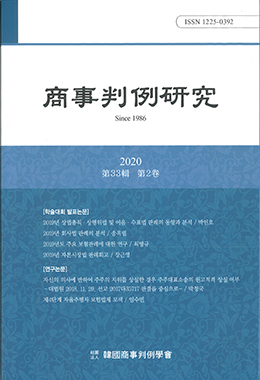본고는 주주대표소송이 제기되어 소송이 진행되는 도중에 주주 자신의 의사가 아닌 주식의 포괄적 교환·이전 등의 회사조직재편으로 주주의 지위를 상실하는 경우 기 제기된 주주대표소송의 원고적격은 유지되는가 아니면 상실되는가 하는 문제를 다루고 있다. 대법원은 주주대표소송의 제소주주가 소송계속 중 주주의 지위를 상실하면 대표소송의 원고적격을 상실하여 소는 부적법 각하되며, 이는 자신의 의사에 반하여 주주의 지위를 상실한 경우에도 같다고 보았다. 또한 「상법」제403조 제5항의 “발행주식을 보유하지 아니하게 된 경우를 제외한다”는 부분은 「헌법」에 합치되는 법문이고 다의적으로 해석될 여지도 없으며, 만일 이 법문을 ‘자유로운 의사로 주식을 매각하여 발행주식을 보유하지 않게 된 경우’로 한정해서 해석한다면 법문의 객관적 한계를 벗어나는 해석으로 판단하였다.
그러나 대법원의 판단처럼 자신의 의사로 주주의 지위를 상실한 경우와 자신의 의사가 아닌 회사조직재편으로 주주의 지위를 상실한 경우를 동등하게 취급하는 것은 ‘같은 것은 같게, 다른 것은 다르게’라는 「헌법」상 평등의 원칙에 위반되는 것이고, 소송의 유지를 목적으로 하는 「상법」제403조 제5항의 취지를 고려해 볼 때 대법원의 판단처럼 상기 법문의 적용범위를 확대하기보다는 ‘다른 것은 다르게’라는 원칙에 따라 축소시키는 목적론적 축소해석이 필요할 것이며, 무엇보다 주주대표소송 제기 후 자신의 의사가 아닌 회사조직재편으로 주주의 지위를 상실한 이후에도 자신의 의사로 주식 전부를 처분하지 않고 주주의 지위를 계속 유지하고 있다면 주주대표소송의 원고적격이 유지된다고 보는 해석이 필요할 것이다.
따라서 주주대표소송의 원고적격을 원론적인 입장에서 해석하고 있는 대법원의 판단은 위법한 행위에 대한 책임을 부담해야 할 회사 이사들에게 오히려 자신들의 책임을 부당하게 회피할 수 있도록 하는 기회를 준다는 점에서 재고의 필요성이 있는 바, 향후 판결에서 해석의 반전을 기대해본다.
This paper addresses the question of whether standing to sue of derivative suit already raised is maintained or lost in case of loss of shareholder status by reorganization of the company such as statutory share exchange and statutory stock transfer rather than the shareholders' own intentions. The Supreme Court ruled as follows in the Korean Supreme Court case, sentenced in November 29th, 2018, Docket Nr. 2017Da35717: If shareholders loses his position, the plaintiff in a fore-going derivative action for the benefit of the company will lose standing to sue. This was considered the same even if the shareholder's status was lost against his will. Besides, Law sentence such as “shareholders does not hold all of the shares issued by the company” of section 403 (5) Korean Commercial Code is no room for interpretation in various ways, if this law sentence is interpreted as being limited to “the case where stock is not held by disposing of stock as a free will”, this is an interpretation that goes beyond objective limits of legal sentence.
However, If these two cases of loss of shareholders' status by their own will and loss of shareholders' status by reorganization of the company rather than their own are treated equally as the Supreme Court judgment, this would violate the principle of equality in the constitution called “the same thing is the same, the other is different”, reduction interpretation in accordance with purpose will be required by the principle called “other things differently” rather than expanding the scope of the law sentence as the Supreme Court judgment, considering the purpose of section 403 (5) Korean Commercial Code in maintaining a lawsuit and above all, if he or she does not dispose of all the stocks at their own will and maintain shareholder's status, it will be necessary to interpret that standing to sue of derivative suit is maintained, even after losing the status of shareholders due to the reorganization of the company rather than their own will after filing a derivative suit.
Therefore, The Supreme Court judgment judging standing to sue of derivative suit by the principle is a need for reconsideration on the grounds that this judgment gives directors of company who are liable for unlawful conduct to the opportunity to unfairly evade their responsibilities, so the author is expected that the interpretation will be reversed in the future ruling.


